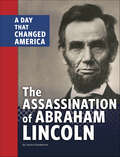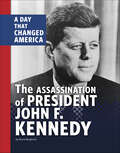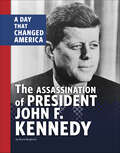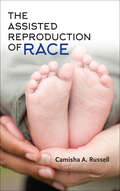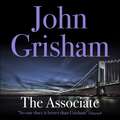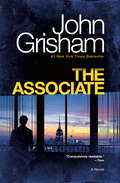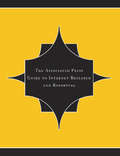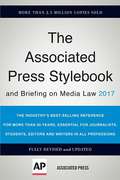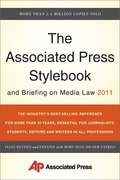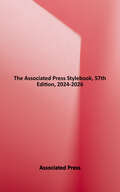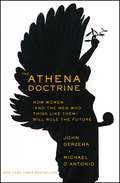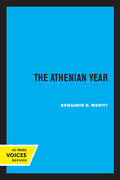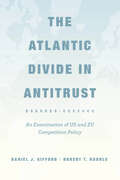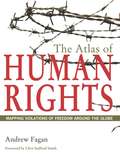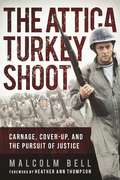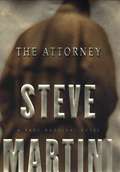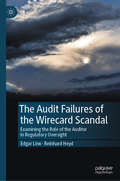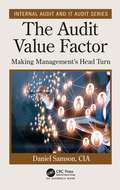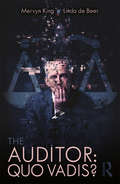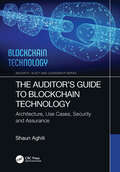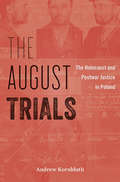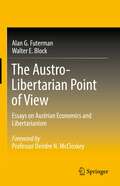- Table View
- List View
The Assassination of Abraham Lincoln (A Day That Changed America)
by Jessica GundersonOn April 14, 1865, only days after the Civil War had come to a close, a gunshot rang out in Ford’s Theatre and President Abraham Lincoln slumped forward in his seat. Hours later, the United States had lost its leader. Now readers can step back in time to learn about what led up to the assassination plot, how the fateful evening unfolded, and the ways in which one tragic day changed America forever.
The Assassination of President John F. Kennedy (A Day That Changed America)
by Bruce BerglundPresident John F. Kennedy was a popular president. On November 22, 1963, he waved to excited crowds from the back of a car as it wound through the streets of Dallas, Texas. Suddenly, gunshots rang out. The president had been shot! He died shortly after. The country had lost its leader. Now readers can step back in time to learn about what led up to the assassination, how the fateful day unfolded, and the ways in which one shocking day changed America forever.
The Assassination of President John F. Kennedy (A Day That Changed America)
by Bruce BerglundPresident John F. Kennedy was a popular president. On November 22, 1963, he waved to excited crowds from the back of a car as it wound through the streets of Dallas, Texas. Suddenly, gunshots rang out. The president had been shot! He died shortly after. The country had lost its leader. Now readers can step back in time to learn about what led up to the assassination, how the fateful day unfolded, and the ways in which one shocking day changed America forever.
The Assassination of President John F. Kennedy: A Day that Changed America (Days That Changed America)
by Bruce BerglundPresident John F. Kennedy was a popular president. On November 22, 1963, he waved to excited crowds from the back of a car as it wound through the streets of Dallas, Texas. Suddenly, gunshots rang out. The president had been shot! He died shortly after. The country had lost its leader. Now readers can step back in time to learn about what led up to the assassination, how the fateful day unfolded, and the ways in which one shocking day changed America forever.
The Assisted Reproduction of Race
by Camisha A. RussellA philosopher examines the social implications of assisted reproductive technologies at the intersection of race, medicine, and bioethics.The use of assisted reproductive technologies (ART)—in vitro fertilization, artificial insemination, and gestational surrogacy—challenges contemporary notions of what it means to be parents or families. Camisha A. Russell argues that these technologies also bring new insight to ideas and questions surrounding race. She does this in part by reframing ART, as medical technologies that also act as technologies of kinship.Thinking about race in terms of technology brings together the common academic insight that race is a social construction with the equally important insight that race is a political tool used in different contexts for a variety of ends. As Russell explores ideas about race through their role in ART, she brings together social and political views to shift debates from what race is to what race does, how it is used, and what effects it has had in the world.
The Associate
by John GrishamKyle McAvoy grew up in his father's small-town law office in York, Pennsylvania. He excelled in college, was elected editor-in-chief of The Yale Law Journal, and his future has limitless potential.But Kyle has a secret, a dark one, an episode from college that he has tried to forget. The secret, though, falls into the hands of the wrong people, and Kyle is forced to take a job he doesn't want-even though it's a job most law students can only dream about.Three months after leaving Yale, Kyle becomes an associate at the largest law firm in the world, where, in addition to practicing law, he is expected to lie, steal, and take part in a scheme that could send him to prison, if not get him killed.With an unforgettable cast of characters and villains-from Baxter Tate, a drug-addled trust fund kid and possible rapist, to Dale, a pretty but seemingly quiet former math teacher who shares Kyle's "cubicle" at the law firm, to two of the most powerful and fiercely competitive defense contractors in the country-and featuring all the twists and turns that have made John Grisham the most popular storyteller in the world, THE ASSOCIATE is vintage Grisham.(P)2009 Random House, LLC
The Associate: A Novel
by John Grisham#1 NEW YORK TIMES BESTSELLER • If you thought Mitch McDeere was in trouble in The Firm, wait until you meet Kyle McAvoy, The AssociateKyle McAvoy possesses an outstanding legal mind. Good-looking and affable, he has a glittering future. He also has a dark secret that could destroy his dreams, his career, even his life. One night that secret catches up with him. The men who accost Kyle have a compromising video they&’ll use to ruin him—unless he does exactly what they say. What they offer Kyle is something any ambitious young lawyer would kill for: a job in Manhattan as an associate at the world&’s largest law firm. If Kyle accepts, he&’ll be on the fast track to partnership and a fortune. But there&’s a catch. Kyle won&’t be working for the firm but against it in a dispute between two powerful defense contractors worth billions. Now Kyle is caught between the criminal forces manipulating him, the FBI, and his own law firm—in a malignant conspiracy not even Kyle, with all his intellect, cunning, and bravery, may be able to escape alive.Don&’t miss John Grisham&’s new book, THE EXCHANGE: AFTER THE FIRM!
The Associated Press Guide To Internet Research And Reporting
by Frank BassFrom the editors at the world-renowned Associated Press, a guide to research, writing style, and reporting using the Internet
The Associated Press Stylebook 2017 and Briefing on Media Law
by Associated Press StaffThe style of the Associated Press is the gold standard for news writing. With The AP Stylebook in hand, you can learn how to write and edit with the clarity and professionalism for which they are famous. Fully revised and updated, this new edition contains more than 3,000 A to Z entries--including more than 200 new ones--detailing the AP's rules on grammar, spelling, punctuation, capitalization, abbreviation, and word and numeral usage. You'll find answers to such wide-ranging questions as: � When should the names of government bodies be spelled out and when should they be abbreviated? � What are the general definitions of the major religious movements? � Which companies do the big media conglomerates own? � Who are all the members of the British Commonwealth? � How should box scores for baseball games be filed? � What constitutes "fair use"? � What exactly does the Freedom of Information Act cover? With invaluable additional sections on the unique guidelines for business and sports reporting and on how you can guard against libel and copyright infringement, The AP Stylebook is the one reference that all writers, editors, and students cannot afford to be without.
The Associated Press Stylebook and Briefing on Media Law (2011 Edition)
by Associated PressThe style of the Associated Press is the gold standard for news writing. With The AP Stylebook in hand, you can learn how to write and edit with the clarity and professionalism for which they are famous.
The Associated Press Stylebook, 57th Edition, 2024-2026
by Associated PressThe spiral-bound Associated Press Stylebook, 57th Edition, includes new chapters on artificial intelligence and criminal justice and a detailed self-editing checklist. Specialized chapters cover sports, business, punctuation, religion, data journalism, inclusive storytelling, health and science, news values, and polls and surveys.
The Athena Doctrine: How Women (and the Men who Think Like Them) will Rule the Future
by Michael D’antonio John GerzemaBrought to life through real world examples and backed by rigorous data, The Athena Doctrine shows how feminine traits are ascending--and bringing success to people and organizations around the world.
The Athenian Year
by Benjamin D. MerittThis title is part of UC Press's Voices Revived program, which commemorates University of California Press’s mission to seek out and cultivate the brightest minds and give them voice, reach, and impact. Drawing on a backlist dating to 1893, Voices Revived makes high-quality, peer-reviewed scholarship accessible once again using print-on-demand technology. This title was originally published in 1961.
The Atlantic Divide in Antitrust: An Examination of US and EU Competition Policy
by Daniel J. Gifford Robert T. KudrleHow is it that two broadly similar systems of competition law have reached different results across a number of significant antitrust issues? While the United States and the European Union share a commitment to maintaining competition in the marketplace and employ similar concepts and legal language in making antitrust decisions, differences in social values, political institutions, and legal precedent have inhibited close convergence. aaaaaaaaaaa With "The Atlantic Divide in Antitrust, " Daniel J. Gifford and Robert T. Kudrle explore many of the main contested areas of contemporary antitrust, including mergers, price discrimination, predatory pricing, and intellectual property. After identifying how prevailing analyses differ across these areas, they then examine the policy ramifications. Several themes run throughout the book, including differences in the amount of discretion firms have in dealing with purchasers, the weight given to the welfare of various market participants, and whether competition tends to be viewed as an efficiency-generating process or as rivalry. The authors conclude with forecasts and suggestions for how greater compatibility might ultimately be attained. "
The Atlas Of Human Rights: Mapping Violations of Freedom Around the Globe
by Andrew FaganIn the post-9/11 world, governments are using the threat of terrorism to justify tightening national security and restricting basic human rights. This timely book addresses the implications of this trend, revealing human rights inequities from nation to nation and the consequences of these inequities worldwide. Inspired by the United Nations' Universal Declaration of Human Rights, Andrew Fagan considers the nature of the state, national identity, and citizenship. His comprehensive and succinct text explores judicial violations and legal restrictions that permit state-sponsored torture, indefinite detention, capital punishment, and police brutality. Vividly illustrated with colorful maps and charts, The Atlas of Human Rights charts both the progress and limitation of free expression and media censorship. It displays the areas that are beset with wars, conflict, migration, and genocide; details the geographic status of sexual freedom, racism, religious freedom, and the rights of the disabled; focuses on women's rights, sex slavery, and the rights of the child. As intolerance threatens diversity on a global scale, The Atlas of Human Rights serves as a crucial intervention to preserving and extending freedom.
The Attica Turkey Shoot: Carnage, Cover-Up, and the Pursuit of Justice
by Heather Ann Thompson Malcolm Bell“Malcolm Bell’s powerful story of the Attica prison uprising . . . has the ring of truth” (Studs Terkel, Pulitzer Prize–winning author and historian). The Attica Turkey Shoot tells a story that New York State did not want you to know. In 1971, following a prison riot at the Attica Correctional Facility, state police and prison guards slaughtered thirty-nine hostages and inmates, and tortured more than one thousand men after they had surrendered. State officials pretended they could not successfully prosecute the law officers who perpetrated this carnage, and then those same officials scurried for shelter when a prosecutor named Malcolm Bell exposed the cover-up. Bell traveled a rocky road to a justice of sorts as he sought to prosecute without fear or favor—in spite of the deck officials had stacked to keep police from facing the same justice that had filled the Attica prison in the first place. His insider’s account illuminates the all-too-common contrast between the justice of the privileged and the justice of the rest. Also included in this book is evidence from recently uncovered tapes that Gov. Nelson Rockefeller knew his order for troopers to attack could cost the lives of hundreds of inmates and all of those hostages. The Attica Turkey Shoot highlights the hypocrisy of a criminal justice system that decides who goes to prison and who enjoys impunity in a nation where no one is said to be above the law.
The Attorney
by Steve MartiniSleuthing California defense counsel Paul Madriani lands one of his twistiest cases to date. His client, sport fisherman Jonah Hale, won $87 million in a lottery but lost his heart. Jonah's got custody of his eight-year-old grandkid Mandy, because his daughter Jessica is a cokehead party animal. Sprung from jail, Jessica demands cash. Jonah says no. So Jessica and Mandy disappear, with help from marital-rape-victim-turned-fanatical-activist Zolanda Suade. Suade's group, Vanishing Victims, specializes in thwarting courts and bashing rich males. Madriani tries to reason with Suade, who almost pulls a gun on him, then taunts him with a press release: Suade's going public with Jessica's charge that Jonah molested Mandy. Madriani's girlfriend works in Child Protective Services, so he gets a tidbit or two of inside info--the charge is phony, but because CPS can't comment on cases, the smear will suffice to ignite a media firestorm. When Suade turns up dead, media interest does not subside. In court, circumstantial evidence forms a tightening noose around Jonah's neck, and Madriani starts wondering whether Jonah did kill Suade. Also, underworld types who may know Jessica and/or a Mexican drug lord start stalking Madriani, and more corpses pop up. Martini, who covered the Manson trial, then became a lawyer and a bestselling novelist, is great at realistic, ingenious courtroom suspense, media-circus scenes, and dramatizing the impact of office politics on legal proceedings. His characters and prose are workmanlike but sturdy. Always grouped with lawyers-turned-writers Scott Turow and John Grisham, Martini thinks Turow's a better writer (in terms of character and dialogue), and Grisham's a natural-born storyteller who towers over all, but that he, Martini, is a better storyteller than Turow and a better writer than Grisham. The Attorney is evidence that he may be right.
The Audit Failures of the Wirecard Scandal: Examining the Role of the Auditor in Regulatory Oversight
by Edgar Löw Reinhard HeydWirecard was the largest economic scandal in the history of Germany. Following the collapse of Wirecard, numerous lawsuits, both criminal and civil by equity and debt investors, were filed not only against Wirecard but also against the auditor Ernst & Young. This book demonstrates that a proper audit in accordance with the auditing standards would have uncovered the fraud much earlier, and details what went wrong. The book first deals with the fundamentals of auditing and examines the Wirecard business models from a legal and economic perspective. Then, the book deals with the fiduciary structure, which there has been often debated. When the fraud was uncovered, it became clear that 1.9 billion Euros that were supposed to be in escrow accounts were not. The book discusses the balance sheet mapping in detail, including the related audit requirements and examines in which balance sheet item the amounts (allegedly) in escrow accounts should have been reported, before examining and weighing the corresponding income statement items. In each chapter, not only are the accounting requirements presented, but the requirements for audit measures based on the respective Standards on Auditing are highlighted and explained in detail. The book places the requirements for reporting in the context of the Wirecard case, and will be of interest to accountants, auditors, market regulators, and credit risk analysts alongside students of accounting/auditing.
The Audit Value Factor (Internal Audit and IT Audit)
by Daniel SamsonThe Audit Value Factor: Making Management’s Head Turn empowers readers with a systematic method to build and maintain a value-centric internal audit organization. The book explores how to identify, quantify, and articulate value for customers. It details six critical success factors: Value propositions that link directly to customer needs Fostering customer relationships using the CREATE model Talent development using the TEAM model Risk expertise that raises awareness, understanding, and action Change management and process optimization using the SMART model Data analytics that provide powerful insights to operations The Audit Value Factor offers easy to use tools and practical strategies that deliver tangible and immediate benefits for the internal audit team. Praise for The Audit Value Factor: Making Management’s Head Turn "Daniel Samson, the inspiring and forward-thinking CAE at SRI International, has created an essential guide to adding value through Internal Audit in his new book The Audit Value Factor. It's an important addition to any internal auditor's toolkit, with helpful suggestions on topics ranging from talent planning to data analytics. I highly recommend it to any internal audit professional looking to "up their game." Laurie A. Hanover, CIA, CAE Sunrun Inc. "Internal Auditors often strive for a ‘seat at the table,’ be it with Business Leaders, Senior Management, the Board, or really, any significant decision maker in an organization. In The Audit Value Factor, Dan Samson provides the roadmap to ensuring that Internal Audit gets not only that seat at the table, but also that role of a critical business partner that is valued in facilitating change and helping an organization achieve its goals." Brian Tremblay, CAE Acacia Communications "Great audit functions generate value and build leadership capacity from staff to CAE. The Audit Value Factor’s compelling examples, data, and actionable tools enable auditors at every level to build relationships of trust, ask the right questions, and deliver powerful insights to their organization." Dr. Kathryn Bingham, Executive Coach and CEO, LEADistics LLC
The Auditor: Quo Vadis?
by Mervyn King Linda de BeerThe audit profession is at a tipping point. Without significant innovation in its business model, staff recruitment strategies and audit execution processes, the audit profession may not remain relevant in the 21st century. The number of claims against auditors has significantly increased over the past twenty years due to the spate of corporate and audit failures early in the 21st century (Enron, Worldcom, Parmalat, etc.). Regulation to monitor professional and ethical standards has increased, leading audit firms to feel under even more financial pressure. In addition, the investor community is calling for greater insight and foresight from auditors. These challenges, coupled with the unlimited liability regime of auditors still applicable in many jurisdictions, are making audit firms and regulators nervous as to the systemic risk of another one of the Big 4 failing. And yet, the audit profession is in place to protect businesses, their wider stakeholder groups, including clients and investors, and society at large. Therefore, this book asks the important question about the profession’s future and engages a broad readership in the discussion of audit failure and reform. Intended to help readers to get up to speed with the issues and possible solutions quickly, this book assists directors, investors, business people and regulators, especially those with a non-financial background, to gain a greater understanding of the challenges and threats being faced by the audit profession, which in turn could disrupt the capital market and affect businesses across the globe. The book outlines the critical success factors needed for a sustainable audit profession.
The Auditor’s Guide to Blockchain Technology: Architecture, Use Cases, Security and Assurance (Security, Audit and Leadership Series)
by Shaun AghiliThe 21st century has been host to a number of information systems technologies in the areas of science, automotive, aviation and supply chain, among others. But perhaps one of its most disruptive is blockchain technology whose origin dates to only 2008, when an individual (or perhaps a group of individuals) using the pseudonym Satoshi Nakamoto published a white paper entitled Bitcoin: A peer-to-peer electronic cash system in an attempt to address the threat of “double- spending” in digital currency. Today, many top-notch global organizations are already using or planning to use blockchain technology as a secure, robust and cutting-edge technology to better serve customers. The list includes such well-known corporate entities as JP Morgan, Royal Bank of Canada, Bank of America, IBM and Walmart. The tamper-proof attributes of blockchain, leading to immutable sets of transaction records, represent a higher quality of evidence for internal and external auditors. Blockchain technology will impact the performance of the audit engagement due to its attributes, as the technology can seamlessly complement traditional auditing techniques. Furthermore, various fraud schemes related to financial reporting, such as the recording of fictitious revenues, could be avoided or at least greatly mitigated. Frauds related to missing, duplicated and identical invoices can also be greatly curtailed. As a result, the advent of blockchain will enable auditors to reduce substantive testing as inherent and control audit risks will be reduced thereby greatly improving an audit’s detection risk. As such, the continuing use and popularity of blockchain will mean that auditors and information systems security professionals will need to deepen their knowledge of this disruptive technology. If you are looking for a comprehensive study and reference source on blockchain technology, look no further than The Auditor’s Guide to Blockchain Technology: Architecture, Use Cases, Security and Assurance. This title is a must read for all security and assurance professionals and students looking to become more proficient at auditing this new and disruptive technology.
The August Trials: The Holocaust and Postwar Justice in Poland
by Andrew KornbluthThe first account of the August Trials, in which postwar Poland confronted the betrayal of Jewish citizens under Nazi rule but ended up fashioning an alibi for the past. When six years of ferocious resistance to Nazi occupation came to an end in 1945, a devastated Poland could agree with its new Soviet rulers on little else beyond the need to punish German war criminals and their collaborators. Determined to root out the “many Cains among us,” as a Poznań newspaper editorial put it, Poland’s judicial reckoning spawned 32,000 trials and spanned more than a decade before being largely forgotten. Andrew Kornbluth reconstructs the story of the August Trials, long dismissed as a Stalinist travesty, and discovers that they were in fact a scrupulous search for the truth. But as the process of retribution began to unearth evidence of enthusiastic local participation in the Holocaust, the hated government, traumatized populace, and fiercely independent judiciary all struggled to salvage a purely heroic vision of the past that could unify a nation recovering from massive upheaval. The trials became the crucible in which the Communist state and an unyielding society forged a foundational myth of modern Poland but left a lasting open wound in Polish-Jewish relations. The August Trials draws striking parallels with incomplete postwar reckonings on both sides of the Iron Curtain, suggesting the extent to which ethnic cleansing and its abortive judicial accounting are part of a common European heritage. From Paris and The Hague to Warsaw and Kyiv, the law was made to serve many different purposes, even as it failed to secure the goal with which it is most closely associated: justice.
The Australia-European Union Free Trade Agreement (European Yearbook of International Economic Law)
by Andrew Mitchell Marc BungenbergThis book gathers a selection of peer-reviewed chapters reflecting on the Australia-European Union Free Trade Agreement (AEUFTA). Since 18 June 2018, ten rounds of negotiations for a AEUFTA have been held in a constructive atmosphere, showing a shared commitment to move forward with this ambitious and comprehensive agreement. After a lengthy and arduous process interrupted by the United Kingdom’s withdrawal from the European Union (EU), the United States’ hesitations regarding the EU’s global strategy and the outbreak of the COVID-19 pandemic, the negotiations between Australia and the European Union finally appear to be nearing completion. In challenging times, both parties share a commitment to a positive trade agenda, and to the idea that good trade agreements benefit both sides by boosting jobs, growth and investment. This book explores the challenges, achievements and missed opportunities in the AEUFTA negotiation process, and examines current legal and political relations between the EU, its Member States and Australia. Furthermore, it examines in detail a wide and diverse range of negotiated areas, including digital trade, services, intellectual property rules, trade remedies and investment screening, as well as dispute settlement mechanisms. Lastly, it sheds light on the likely nature of future commercial relations between Australia and the EU. Written by a team of respected authors from leading institutions in both Australia and Europe, the book provides a valuable, interdisciplinary analysis of the AEUFTA.
The Australian Judiciary
by H P Lee Enid CampbellThe second edition of HP Lee's The Australian Judiciary provides a timely update to this seminal text. The only definitive survey of the entire Australian judiciary, this text describes and evaluates the work, techniques, problems and the future of the different tiers of courts and judges. It discusses the role of the judiciary as the third sector of government, and analyses and comments on judicial conduct, judicial independence and impartiality, the work of judges beyond the courts, the accountability of judges, and the dangers to judicial institutions. It is an excellent reference work which will appeal to legal scholars and practitioners throughout Australia and internationally.
The Austro-Libertarian Point of View: Essays on Austrian Economics and Libertarianism
by Walter E. Block Alan G. FutermanThis book covers several areas of economic theory and political philosophy from the perspective of Austrian Economics and libertarianism. As such, it deals with Epistemology and Methodology, Microeconomics, Macroeconomics, Labor Economics, International Economics, Political Philosophy, Law and Public Policy, all from the Austro-libertarian perspective.Hence, this book offers an integrated view of libertarianism and Austrian economics in the light of recent debates in the areas of economic science and political philosophy. Moreover, it builds from the foundations of the Austrian approach (epistemology and methodology), while the latter material deals with its application to the individual from the microeconomic perspective, which in turn allows an exploration of subjects in macroeconomics. Additionally, this work applies Austro-libertarianism to law, politics, and public policy. Thus, it offers a unified view of the entire approach, in a logical progression, allowing the readers to judge this perspective in full.Futerman and Block say that their book is not a manual, which I suppose it is not. But it is a collection of highly pertinent essays, from which you can understand what is mistaken in the orthodoxy of economics, law, and politics. The central term of art in Austrian economics is that phrase “human action.” It is the exercise of human will, not the blind bumping of one molecule against another or one organism against another, as in the physical sciences…Futerman and Block distinguish Austrian economics as a scientific enterprise based on liberty of the will from “libertarianism” as an advocacy based on policies implied by such liberty. “Although Austrian economics is positive and libertarianism is normative,” they write, “this book shows how both are related; how each can support the other.” Indeed they do.Deirdre N. McCloskey, PhDUIC Distinguished Professor of Economics and of History Emerita,Professor of English Emerita,Professor of Communication Emerita,University of Illinois at Chicago
